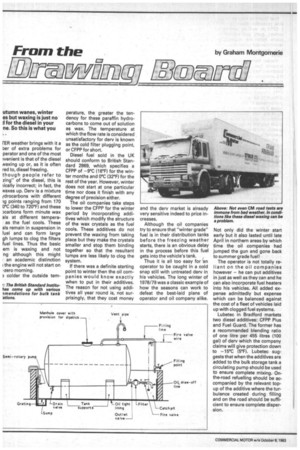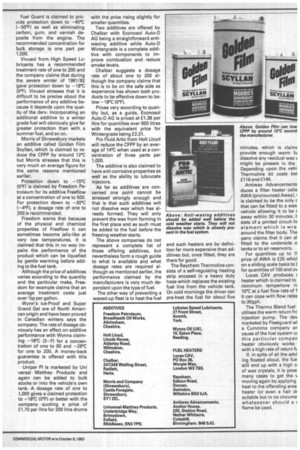TOO .
Page 56

Page 57

If you've noticed an error in this article please click here to report it so we can fix it.
rER weather brings with it a Der of extra problems for perator and one of the most wenient is that of the diesel A/axing up or, as it is often red to, diesel freezing.
though people refer to zing" of the diesel, this is lically incorrect; in fact, the waxes up. Dery is a mixture idrocarbons with different Ig points ranging from 170 0°C (340 to 720°F) and these )carbons form minute wax als at different temperaas the fuel cools. These als remain in suspension in fuel and can form large gh lumps to clog the filters fuel lines. Thus the basic em is waxing and not ng although this might an academic distinction the engine will not start on -zero morning.
.3 colder the outside tern perature, the greater the tendency for these paraffin hydrocarbons to come out of solution as wax. The temperature at which the flow rate is considered unsatisfactory for dery is known as the cold filter plugging point, or CFPP for short.
Diesel fuel sold in the UK should conform to British Standard 2869, which specifies a CFPP of —9°C (16°F) for the winter months and 0°C (32°F) for the rest of the year. However, winter does not start at one particular time nor does it finish with any degree of precision either.
The oil companies take steps to lower the CFPP for the winter period by incorporating additives which modify the structure of the wax crystals as the fuel cools. These additives do not prevent the waxing from taking place but they make the crystals smaller and stop them binding together so that the resultant lumps are less likely to clog the system.
If there was a definite starting point to winter then the oil companies would know exactly when to put in their additives. The reason for not using additives all year round is, not surprisingly, that they cost money and the dery market is already very sensitive indeed to price increases.
Although the oil companies try to ensure that "winter grade" fuel is in their distribution tanks before the freezing weather starts, there is an obvious delay in the process before this fuel gets into the vehicle's tank.
Thus it is all too easy for an operator to be caught in a cold snap still with untreated dery in his vehicles. The long winter of 1978/79 was a classic example of how the seasons can work to defeat the best-laid plans of operator and oil company alike Not only did the winter start early but it also lasted until late April in northern areas by which time the oil companies had jumped the gun and gone back to summer grade fuel!
The operator is not totally reliant on the oil companies however — he can put additives in just as well as they can and he can also incorporate fuel heaters into his vehicles. All added expense admittedly but expense which can be balanced against the cost of a fleet of vehicles laid up with clogged fuel systems.
Lubetec in Bradford markets two diesel additives: CFPP Plus and Fuel Guard. The former has a recommended blending ratio of one litre per 455 litres (100 gal) of dery which the company claims will give protection down to —15°C (5°F). Lubetec suggests that when the additives are added to the bulk storage tank a circulating pump should be used to ensure complete mixing. Onthe-road refuelling should be accompanied by the relevant topup of the additive where the turbulence created during filling and on the road should be sufficient to ensure complete dispersion. Fuel Guard is claimed to provide protection down to —45°C (-50°F) as well as eliminating carbon, gum, and varnish deposits from the engine. The recommended concentration for bulk storage is one part per 1,000.
Vivusol from High Speed Lubricants has a recommended treatment rate of one to 200 and the company claims that during the severe winter of 1981/82 gave protection down to —18°C (0°F). Vivusol stresses that it is difficult to be precise about the performance of any additive because it depends upon the quality of the derv. Incorporating an additional additive to a winter grade fuel will obviously give far greater protection than with a summer fuel, and so on.
Morris of Shrewsbury markets an additive called Golden Film Scyllan, which is claimed to reduce the CFPP by around 12°C but Morris stresses that this is very much an average figure for the same reasons mentioned earlier.
Protection down to —15°C (5°F) is claimed by Freedom Petroleum for its additive Freeflow at a concentration of one to 500. For protection down to —20°C (-4°F), a dosage rate of one to 200 is recommended.
Freedom warns that because of the physical and chemical properties of Freeflow it can sometimes become jelly-like at very low temperatures. It is claimed that this in no way impairs the performance of the product which can be liquefied by gentle warming before adding to the fuel tank.
Although the price of additives varies according to the quantity and the particular make, Freedom for example claims that an average treatment costs just over 1/2p per gallon.
Wynn's Ice-Proof and Super Grand Gel are of North American origin and have been proved in Canadian winters says the company. The rate of dosage obviously has an effect on additive performance with Wynns claiming —16°C (3—F) for a concentration of one to 80 and —26°C for one to 200. A money-back guarantee is offered with this product.
Unipar PI is marketed by Uni versal Matthey Products and again can be added to bulk stocks or into the vehicle's own tank. A dosage rate of one to 1,000 gives a claimed protection to —18°C (0°F) or better with the company quoting a price of £1.70 per litre for 200 litre drums with the price rising slightly for smaller quantities.
Two additives are offered by Chalbar with Econosol Auto-D AG being a straightforward antiwaxing additive while Auto-D Wintergrade is a complete additive with components to improve combustion and reduce smoke levels.
Chalbar suggests a dosage rate of about one to 200 although the company claims that this is to be on the safe side as experience has shown both products to be effective down to below —18°C (0°F).
Prices vary according to quantity but, as a guide, Econosol Auto-D AG is priced at £1.38 per litre for quantities over 600 litres with the equivalent price for Wintergrade being £2.31.
Pro Fluid Artic from Holt Lloyd will reduce the CFPP by an average of 14°C when used at a concentration of three parts per 1,000.
The additive is also claimed to have anti-corrosive properties as well as the ability to lubrucate injectors.
As far as additives are concerned one point cannot be stressed strongly enough and that is that such additives will not dissolve wax which has already formed. They will only prevent the wax from forming in the first place and as such must be added to the fuel before the freezing weather starts.
The above companies do not represent a complete list of those offering additives, but nevertheless form a rough guide to what is available and what dosage rates are required although as mentioned earlier, the performance claimed by the manufacturers is very much dependent upon the type of fuel.
The other way of preventing a waxed-up fleet is to heat the fuel and such heaters are by definition far more expensive than additives but, once fitted, they are there for good.
The Raychem Thermoline con sists of a self-regulating heating strip encased in a heavy duty hose which replaces the existing fuel line from the vehicle tank. On cold mornings the driver can pre-heat the fuel for about five minutes, which is claim provide enough warm fu dissolve any residual wax r might be present in the Depending upon the vehi Thermoline kit costs bet £116 and £149,
Antiwax Advancements duces a filter heater calla AWA (pronounced Away), is claimed to be the only c that can be fitted to a wax vehicle allowing it to be c away within 30 minutes. I. sists of a printed circuit hE element which is wra around the filter body. The pany claims that it can al fitted to the underside o tanks or to air reservoirs.
For quantities up to 11 price of AWA is £25 whicl on a sliding scale basis to f for quantities of 100 and ov Lucas CAV produces. r heater which is claimed to minimum temperture ri 10°C at a fuel flow rate of 1 It can cope with flow rates to 30gph.
The Thermo Blend fuel utilises the warm return frc injection pump. The dev marketed by Fleetguard wl a Cummins company an cause of the fuel system ur this particular cornpan heater obviously works with a high rate of return
If, in spite of all the advi ing floated about, the fue still end up with a high GI of wax crystals, it is pass many cases to get the v moving again by applying heat to the offending area. heater (or even a hair dr suitable but in no circums. whatsoever should a r flame be used.




































































































